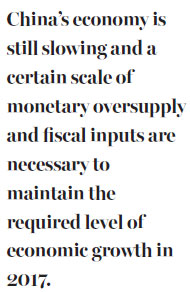Key reforms to help unleash growth

If urban real estate demand is released, housing stock will decline and developers will be able to pay off debts
China's economy grew 6.7 percent year-on-year in 2016, its slowest growth in 26 years, but remained within the government's target range set for the year, official data showed Jan 20.
As for the economy this year, the tone-setting Central Economic Work Conference in mid-December gave priority for the year to the pursuit of economic advancement while maintaining stability.
Maintaining economic growth will still be at the top of China's economic agenda for 2017. Some may argue that since China's economy has remained on an upward trajectory, its previous relatively loose monetary and proactive fiscal policies should be brought to an end. However, China's economy is still slowing and a certain scale of monetary oversupply and fiscal inputs are necessary to maintain the required level of economic growth in 2017. The only quantitative economic target for the 13th Five-Year Plan (2016-20) period is to double the country's 2010 per-capita disposable income by 2020. For that goal to be attained, the average economic growth rate must be no less than 6.5 percent during the five-year period.
Despite the necessary efforts to maintain the required level of economic growth in 2017, China also has to advance its industrial structural adjustments. As President Xi Jinping said at the Central Economic Work Conference in December, one does not take precedence over the other, they are of equal importance. Thus, the country must find breakthrough areas if both tasks are to be done well.

To this end, the government should subsidize people's livelihoods, such as advancing real estate destocking in the third- and fourth-tier cities, one of the key tasks listed at the Central Economic Work Conference for 2017. To achieve this, the government should no longer confine its real estate destocking to calls for rural residents to buy housing in cities while stopping short of targeted measures to encourage them to do so. Apartments in these cities are usually priced between 3,000 yuan ($347; 407 euros; 350) and 4,000 yuan per square meter, and if a subsidy of 1,000 yuan per sq m is offered to homebuyers, that may spur rural residents to buy houses in cities for relocation.
There is a huge demand to be tapped. Many young migrant workers work in cities but live in their rural hometowns because they cannot afford to buy a home in the city where they work. Most of them would choose to relocate to a city if they had the purchasing power to buy a home and ensure their children have access to education.
If the potential urban real estate demand of rural residents is fully released, the country's huge housing stock will decline quickly, and developers will consequently get money to pay off debts to banks, which will in turn mitigate the pressure of bad debts on banks. The 700 billion yuan in subsidies for the current total unsold housing area of 700 million sq m is affordable for the country, and it would improve people's livelihoods while facilitating the country's structural adjustment to maintain its economic growth.
The country should also take advantage of its structural adjustments to advance the reform of State-owned enterprises through programs like debt-to-equity swaps. The State Council, China's Cabinet, has formulated a guideline document aimed at promoting such swaps, as this is a necessary step toward reforming SOEs, given that, as a whole, they now have a 66 percent debt ratio and their economic means and corporate governance structure have crippled their flexibility and economic vitality.
The mixed-ownership direction of SOEs' future reform, discussed at the most recent Central Economic Work Conference, offers mutually beneficial opportunities. The entry of private capital into SOEs and their participation in the management of SOEs would improve the efficiency of these enterprises by changing their governance structure, enhancing their operations and promoting better use of their powerful technology and manpower.
Through such reforms and efforts, China's economic growth in 2017 is expected to outperform that of 2016.
The author is the director of the China Center for Economic Research and dean of the National School of Development at Peking University. The views do not necessarily reflect those of China Daily.
(China Daily Africa Weekly 01/27/2017 page12)
Today's Top News
- Crossing a milestone in the journey called Sinology
- China-Russia media forum held in Beijing
- Where mobility will drive China and the West
- HK community strongly supports Lai's conviction
- Japan paying high price for PM's rhetoric
- Japan's move to mislead public firmly opposed






























